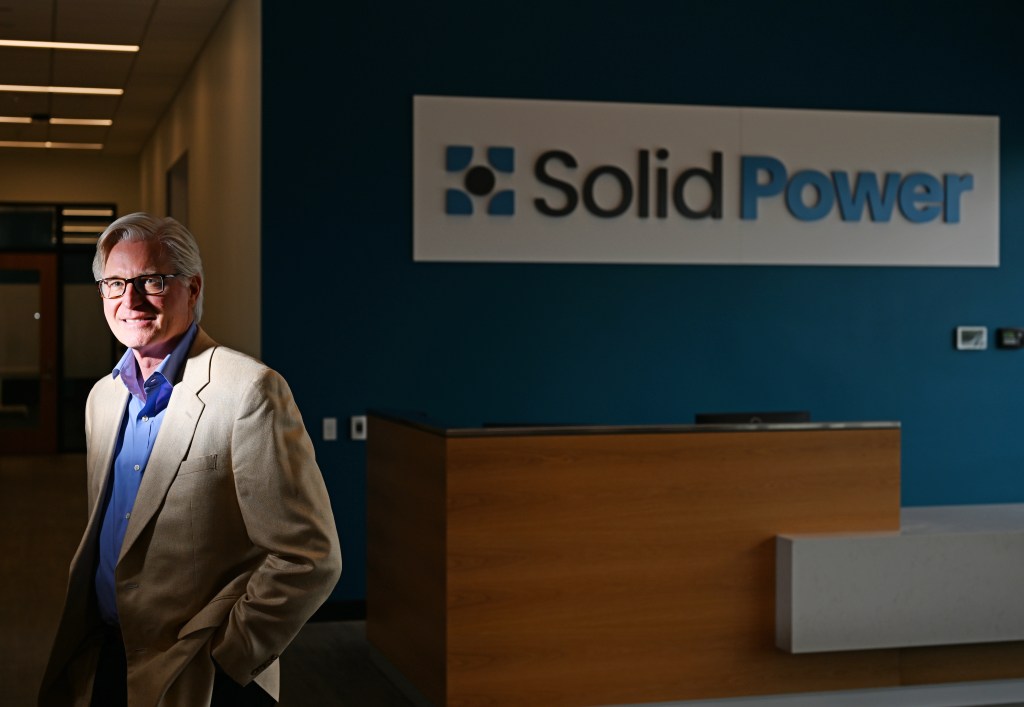
Colorado’s Solid Power ramps up solid state battery cell production
[ad_1]
Solid Power, spun out of a research venture at the University of Colorado in Boulder, is producing the material for solid state battery cells in a new, 75,000-square-foot factory in Thornton and is looking at expanding operations globally in the next year or so.
The company, with a smaller production facility in Louisville, is one of several, including startups and large auto manufacturers, striving to commercialize solid state batteries, seen as essential to accelerating the transition to electric vehicles.
John Van Scoter, who joined as CEO in June, believes Solid Power is well positioned to be a leader in that quest.
“One of things I found so refreshing after I joined was the whole team thinks about very high volume manufacturing with everything that we do. For an early-stage company, that’s quite unique in my experience,” Van Scoter said. “Usually it’s ‘We have to make it work,’ and then, ‘Now we have to figure out how to make it work at volume.’”
Van Scoter succeeded Doug Campbell, who co-founded Solid Power in 2011. Campbell oversaw the forging of partnerships with BMW and Ford and the company going public in 2021.
Campbell resigned as CEO and from his seat on the board of directors in December 2022. At the time, the board said members and Campbell decided it was the right time for a new leader “who will drive our product development and commercialization capabilities.”
“Doug is a great entrepreneur. To get the company from two employees up to 50 was a huge accomplishment,” said Kevin Paprzycki, Solid Power’s chief financial officer.
Van Scoter believes businesses go through different life cycles and Solid Power now faces the challenges of commercializing its technology.
“That’s really what I’ve been doing most of my career, and so I thought it was a really good match,” Van Scoter said of his decision to join the company.
Van Scoter was with the technology company Texas Instruments for 30 years. He held senior vice president positions. He was also CEO, president and chairman of the solar power company eSolar Inc. and most recently a vice president at SRI International Inc., a nonprofit research institute and organization based in Menlo Park, Calif.
Solid Power’s business model, which Van Scoter called “capital light,” is impressive, he said. The company is producing battery cells, but its main objective is to produce the sulfide-based electrolyte used in the cells rather than manufacture batteries.
“It opens up our market. Rather than competing with specific battery makers, we can supply the electrolyte to them potentially,” Van Scoter. “Secondarily, around the capital-light business model, it affords us the chance not to have to incur the large capital costs of building giga factories.”
Solid Power reported second-quarter earnings of $4.9 million, up from $2.3 million in the second quarter of 2022. Revenue for the first half of the year was $8.7 million, up $3.9 million from the first half of 2022.
Operating expenses increased, the company said, due to investments in product development and the expansion of operations. Solid Power reported an operating loss of $22.2 million in the second quarter and a net loss of $12.2 million, or $0.07 per share.

Pursuing the holy grail
Solid state batteries have been called the “holy grail” of electrifying transportation. They use solid materials, such as sulfide or polymers, as electrolytes to move the ions, the charge-carrying particles, through the cell. The charge moves more easily through a lithium ion battery that uses liquids or gels, which can be volatile and flammable.
A solid state cell is smaller and more energy dense, which translates into a greater range of mileage. Van Scoter Solid Power has shown on smaller cells it has produced that the range could increase at least twofold and charging times could be reduced to as little as 15 minutes or less for an 80% charge.
“Solid-state battery technology holds great promise due to its potential to offer higher energy density, improved safety, faster charging times, and longer lifespan compared to traditional lithium-ion batteries,” said Jon Morgan, CEO of Venture Smarter, a consulting firm.
However, there are still significant challenges to overcome before widespread adoption of the technology can occur in the electric vehicle market, Morgan said in an email.
“Several companies have been actively working on solid-state battery technology and have made notable advancements. Companies like Toyota, QuantumScape, and Solid Power have emerged as key players in this field,” Morgan said.
Solid Power is working with the government on research into eliminating cobalt and nickel from the battery cells. The mining of cobalt has raised serious human rights and environmental concerns.
Although Solid Power recently hosted a grand opening for its electrolyte production plant, the company is already planning ahead for further expansion. The goal is to produce 30 metric tons of electrolyte annually at the Thornton facility, or enough for roughly 200,000 cells for electric vehicles.
“We are not at that level today but we hope to be at that level by the end of this year. We believe that capacity will be enough to satisfy the near-term requirements of our customers worldwide,” Van Scoter said.
The company might look at increasing production capacity around 2026. Solid Power employs about 250 people and is hiring more. Van Scoter said the workforce grew to 200 from 50 over the last 18 months.
The company expects to bring on new partners soon. BMW, one of its investors and partners, has engineers working on-site with Solid Power, which expects to deliver battery cells to the automaker before the end of the year.
“We hope (the cells) end up in their demo-car program before 2025,” Van Scoter said.

Solid Power extended its partnership with Ford last year. Van Scoter said the company meets with Ford regularly to support its cell-development program.
And Solid Power is strategizing about expanding operations in South Korea.
“South Korea is really the epicenter of the next generation of batteries, so we want to be there to support our customers that are on the peninsula as well as have access to the latest technology and the latest talent,” Van Scoter said.
But Solid Power is a “homegrown Colorado company” and has no intention of changing that, Van Scoter said. “We expect to continue to invest in Colorado and in the Denver area.”
Colorado is a good location because of the access to talent, Van Scoter added. Solid Power has hired a lot of people out of CU, Colorado State University and the Colorado School of Mines.
Van Scoter said the area is also business-friendly. He said the company was able to expand in “record time.”
“It was less than 15 months from design concept to when we actually started populating and ramping up production” in Thornton, Van Scoter said.
And when will electric vehicles be regularly powered by solid state batteries?
“If you look back over the history of announcements various companies have made, some thought as early as 2026, some 2030,” Van Scoter said. “We think the sweet spot, and where we’ll end up hopefully, will be around 2028.”
[ad_2]
Source link




